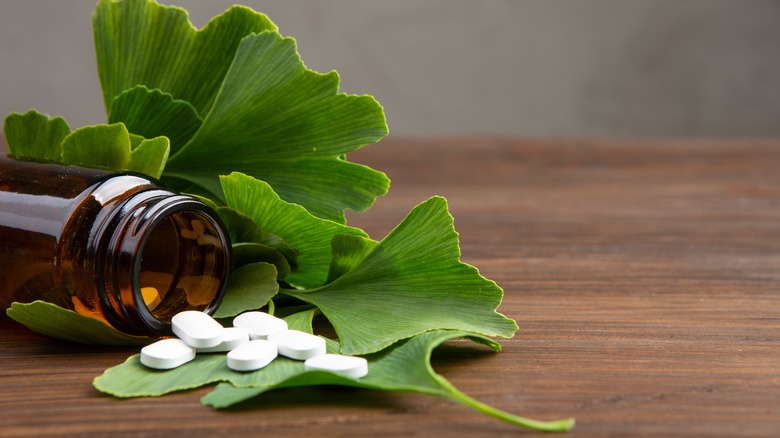Ginkgo Biloba Could Be Dangerous If You Already Take These Medications
When walking down your grocery store's medicine aisle, you may stumble upon a bottle with a uniquely interesting name — ginkgo biloba. Before purchasing the supplement, you might want to find out more about where it comes from. According to Medical News Today, ginkgo biloba is a commonly used herbal medicine derived from the dried green leaves of the ginkgo tree.
Due to its ability to withstand catastrophic events and live for more than 1,000 years, the ginkgo tree is described as a "living fossil." Ginkgo trees are among the oldest tree species, being so ancient that they coexisted with dinosaurs, as explained by botanist Peter Crane (per Yale School of the Environment).
If you're looking into trying out herbal medicine, you'll surely want to know if ginkgo biloba is worth the hype. Ginkgo biloba contains flavonoids, which are plant-based antioxidants (per Mount Sinai). It also contains terpenoids that help to improve the circulation of blood in the body.
The supplement has been reported to potentially enhance thinking, memory, and learning in some studies on participants with Alzheimer's disease. However, the Mayo Clinic stresses that further research is needed to verify this claim, as there have been conflicting results on whether the supplement is effective for individuals experiencing cognitive impairments.
Some scientists have also been investigating ginkgo biloba as a potential treatment option for depression and anxiety, according to a 2022 review published in the ASEAN Journal of Psychiatry.
While ginkgo biloba could have benefits, it should be avoided if you're already taking certain medications.
Medications to avoid while taking ginkgo biloba
Before you consider taking ginkgo biloba, you should make sure you aren't taking any medications that can have a negative interaction with it. For example, if you're having body aches and pains, you may want to think twice about reaching for Advil if you've also been taking the herbal supplement.
According to St. Luke's Hospital, it's possible for blood thinners to interact dangerously with ginkgo biloba because it also contains blood-thinning properties. Taking blood thinners like aspirin, clopidogrel, or warfarin with ginkgo biloba may increase the risk of abnormal bleeding in some individuals (per Mayo Clinic).
The use of ginkgo biloba may also reduce the effectiveness of anticonvulsant medications, and could possibly increase seizures in individuals with epilepsy (per American Chemical Society). The authors of a 2010 study published in the Journal of Natural Products hypothesized that the ginkgotoxin found in ginkgo biloba may disrupt a chemical signaling pathway in the brain and potentially induce epileptic seizures.
If you're taking antidepressants, you may also want to reconsider taking ginkgo biloba. As explained by WebMD, taking antidepressants like Prozac and Tofranil at the same time as ginkgo biloba may reduce the effectiveness of these drugs in treating depression symptoms. Ginkgo biloba can also reduce the effectiveness of Xanax, a medication used to treat anxiety.
Because there can also be interactions between ginkgo biloba and other medications, it's a good idea for you to consult your doctor before taking it so you can prevent any serious side effects.


